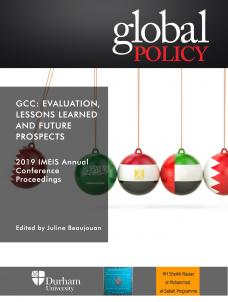
Nearly four decades have passed since the establishment of the Gulf Cooperation Council (GCC) in 1981. In a deeply divided and dysfunctional region, for some it is still an anti-Arab forum that keeps Arab divisions alive, for many others the it is a beacon of hope for Arab integration efforts and for wider prosperity.
The contributors to this volume explore the policies and priorities of GCC states, the tensions within and across the organisation, and behavioural traits of its key actors. Several also pay close attention to the GCC’s interactions with the wider region and in particular such countries as Iran and Turkey.
To download the open access e-book for e-readers, including Kindles, please click here.
To download as a PDF, please click here.
Contents
Introduction – Prof. Anoush Ehteshami, Director of the Institute of Middle Eastern and Islamic Studies
1 The Gulf Cooperation Council (GCC) and its Future Prospects – Dr. Abdullah Baabood
2 The Evaluation of the GCC from the Perspective of Small State Studies – Dr. Máté Szalai
3 The Gulf Crisis: The Economic Perspective and the Role of the Gulf Regional Hubs – Moustafa Ali
4 Oman: Institutional Genealogy of an Exceptional Foreign Policy – Noha Ezzat
5 Saving the GCC: Kuwait’s Mediation Role in Qatar Crisis – Dr. Tahani Al-Terkait
6 The Impact of Security Threat on the Unity of GCC – Dr. Shady A. Mansour
7 Iran, Turkey and the Qatar Crisis with the GCC. Emerging Middle Powers in the Middle East and their Struggle for Hegemony – Dr. Alberto Gasparetto
8 United We Stand? Measuring Threat Perception of Iran within the Riyadh-Aby Dhabi Axis – Cinzia Bianco
9 Roundtable Report – The Future of the GCC in a Troubled Region